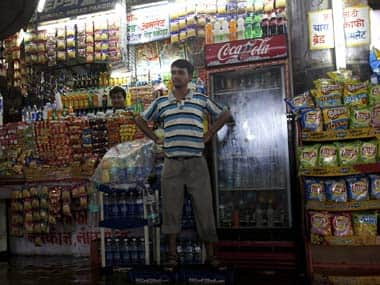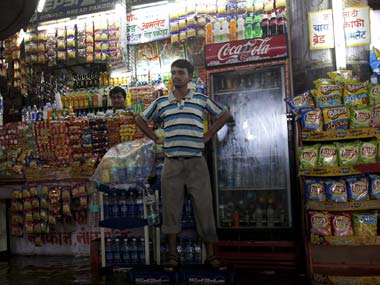Let’s face it: Big Brother - as far as the kirana is concerned - has been here for some time now, and is here to stay. Forget, for the moment, the nuance of who owns the organised retail outlets; they already exist and do not bother the kirana a whit.
To understand why, I thought I’d take a look at where my neighbours and I buy our daily requirements from. I stay on Mount Mary Road, in Bandra, Mumbai, about halfway up a hill.Bang opposite the building, Vindhyachal, is the archetypical kirana shop, about 30-40 square feet. It’s here that all of us buy immediate needs - bread, butter, eggs, biscuits, milk, tea, coffee, water, soda, beverages, juices, dahi, soap, shampoo, detergents, a ball-point pen, pencils, batteries, candles, etc. You get the drift. All the day-to-day stuff.
[caption id=“attachment_143000” align=“alignleft” width=“380” caption=“The magic of the kirana is the extraordinary understanding of consumer needs and wants.Reuters”]
 [/caption]
[/caption]
You get condoms, too, of course.
The shop is open from about 6.30 am to midnight, which is wonderfully convenient if, as I often do, you run out of cigarettes or need a few sodas and Cokes at short notice when unexpected guests drop in. Or packs of playing cards if the old ones get sticky halfway through the bridge session.
And you don’t even have to leave the house. You call the watchman on the intercom, he strolls across the road, picks up the requisites, hands it over to the liftman who rings your doorbell.
What about the payment, you ask? That’s the magic of the kirana, the extraordinary understanding of consumer needs and wants. You get ‘credit’. Some square up the next time they go down, some do it once a week (every Sunday is my pattern), some once a month.
My neighbourhood kirana doesn’t stock pulses, rice, imported toiletries, vegetables, and so on. For such needs, we can walk down to Patel’s, which is about 500 metres from the building. They’ve got everything that one might need for daily consumptionthat ‘my’ kirana doesn’t stock . Or, of course, if I’m super organised, we can call and have them delivered. If one doesn’t want to pay the premium for the fruit and vegetables at Patel’s, make a longer trudge to Pali market.Lazy? Call the vendors - they all have mobile phones and they all deliver.
Impact Shorts
More ShortsMedicines? Walk down to Asian Chemist. Or call them, they deliver, too.
Alcohol? Jude Wines is on my speed dial and delivers within 20 minutes. Oh, and they can supply ‘Perfect’ ice and cigarettes as well.
There’s no real need for me to go to ‘organised’ retail. With the solutions that are available, I’ve got a kirana across the road that works in all the hours that matter to me, I’ve got a medical store, an upmarket kirana in Patel’s and an alcohol shop accessible on phone and home delivery.
Organised retail in the sense that it is being spoken about today promises bigger and better - and possibly cheaper. But to truly benefit from these megastores, it’s buying in higher volumes that will matter. Buy two of something, get one free. Buy a case of a beverage, get 3 bottles free, and so on.
But for all those who live in Mumbai - or, indeed, in any large city, where is the space at home to store all the stuff you’ve got to benefit from the ‘deals’?
As importantly, all the shopping I’ve described can be done by me without having to travel halfway across town. There are two attendant costs to this - the cost of the travel and the cost of the time taken.
Of course, one will go to the mega store every once in a while and spend money one doesn’t have on things one doesn’t need. But I can’t see how I’ll manage without my kirana-across-the-road, Patel’s, Asian Chemist and Jude.
They’ll all survive. They’ll prosper and flourish - and no amount of FDI will change that.
Anant Rangaswami was, until recently, the editor of Campaign India magazine, of which Anant was also the founding editor. Campaign India is now arguably India's most respected publication in the advertising and media space. Anant has over 20 years experience in media and advertising. He began in Madras, for STAR TV, moving on as Regional Manager, South for Sony’s SET and finally as Chief Manager at BCCL’s Times Television and Times FM. He then moved to advertising, rising to the post of Associate Vice President at TBWA India. Anant then made the leap into journalism, taking over as editor of what is now Campaign India's competitive publication, Impact. Anant teaches regularly and is a prolific blogger and author of Watching from the sidelines.
)